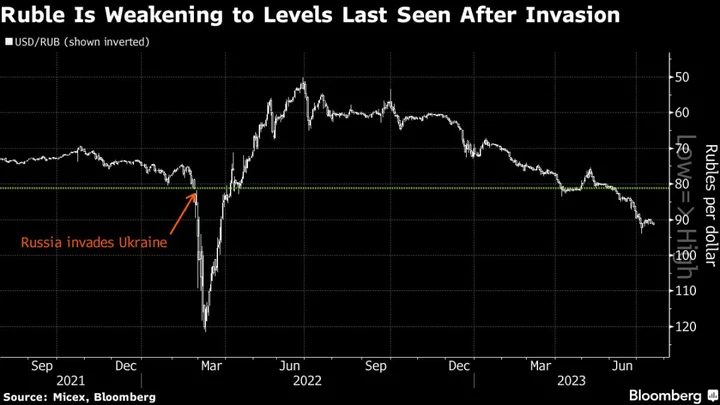Russia raised interest rates for the first time since emergency measures taken after the invasion of Ukraine almost 17 months ago, delivering a bigger increase than forecast by economists and signaling borrowing costs may rise higher still.
The central bank on Friday lifted its benchmark to 8.5% from 7.5%. Almost all economists surveyed by Bloomberg expected a rate increase, with forecasts ranging between a hike of 25 and 75 basis points. Goldman Sachs Group Inc. was the lone dissenter predicting a hold.
“The Bank of Russia holds open the prospect of a further key rate increase at its next meetings to stabilize inflation close to 4% in 2024 and further on,” it said in a statement accompanying the decision.
A weaker ruble accelerated the timeline for monetary tightening after months of warnings by the central bank that higher rates were on the way in response to inflationary risks from heavy government spending, sanctions and labor shortages caused by the call-up of men to fight in Ukraine.
A failed mutiny in June further thrust the ruble into the spotlight by adding to pressure from a deterioration in foreign trade that’s turned it into one of the worst performers this year in emerging markets against the dollar.
The ruble traded little changed versus the dollar after the announcement on Friday. Governor Elvira Nabiullina will speak at a news conference at 3 p.m. in Moscow.
The decision to lift rates ends the longest pause in more than seven years by the central bank, which hasn’t adjusted rates since six rounds of easing ended in September. It last hiked the benchmark days after the invasion with an emergency increase to 20%, the highest in almost two decades, as unprecedented international sanctions battered Russia’s economy and assets.
In their statement, policymakers said price growth is currently running above 4% in annualized terms and is “still on the rise.” The central bank tweaked its forecast for inflation and now predicts it will end the year at 5%-6.5%.
“The increase in domestic demand surpasses the capacity to expand production, including due to the limited availability of labor resources,” it said. “This reinforces persistent inflationary pressure in the economy.”
What Bloomberg Economics Says...
“The Bank of Russia’s bold move to raise it’s key rate by 100 basis point is likely to support Russia’s weakening currency and reduce credit growth. Prior to today’s increase, the rate was probably too low to stem rising capital outflows and keep inflation around its 4% target. We don’t expect the Bank of Russia to stop at one hike, but neither do we see this (mini-)hiking cycle taking the policy rate above 10%.”
—Alexander Isakov, Russia economist. For more, click here
The armed rebellion by Wagner mercenaries that briefly threatened President Vladimir Putin’s power carries the risk of triggering further outflows of money at a time when falling energy earnings and a recovery in imports drain the economy of hard currency.
It’s a prospect that could be a drag on the ruble in the months to come. The Russian currency has already lost about 18% this year, with more than a third of the depreciation coming after Wagner’s attempted march to Moscow.
Three-month implied volatility for the currency, a gauge of anticipated moves, is also the world’s highest.
Though Nabiullina has called the ruble’s floating exchange rate “a blessing” for the economy, the currency’s retreat is making imports more expensive.
The central bank still expects to meet its 4% target for inflation next year, according to an updated outlook published on Friday, which included an improved forecast for economic growth in 2023.
“The economy has in general completed its recovery phase,” the central bank said. “In the future, the economy’s growth rates will gradually converge towards the rates that are consistent with a balanced growth path.”
Rosbank economist Evgeny Koshelev called Friday’s move “an unusual step” that suggests the central bank is trying to “get ahead of the risks.”
(Updates with central bank forecasts, analyst comment starting in eighth paragraph.)

